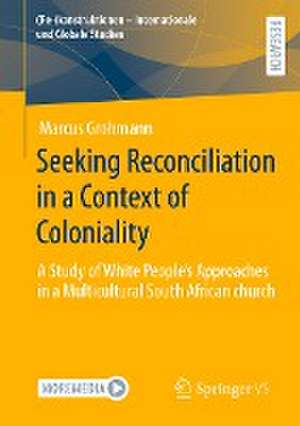Seeking Reconciliation in a Context of Coloniality: A Study of White People’s Approaches in a Multicultural South African church: (Re-)konstruktionen - Internationale und Globale Studien
Autor Marcus Grohmannen Limba Engleză Paperback – 14 mai 2023
The findings of this ethnographic study reveal how – motivated by a ‘Hope for transformation from within’ – racial integration often took precedence over equity. Eurocentric leanings were found to be both acknowledged and downplayed. With the emphasis on inclusion and upliftment, the equally sought-after cultural diversity was limited by the inadvertent setting up of boundaries, particularly regarding language and theology.
Grohmann concludes that the perceptiblebut not prominent mode of choosing vulnerability, i.e. relating on other people’s terms, constitutes a promising alternative to conventional ways of tackling inequalities. This decolonial approach to reconciliation would have the potential to advance both equity and equality.
Preț: 693.39 lei
Preț vechi: 815.75 lei
-15% Nou
Puncte Express: 1040
Preț estimativ în valută:
132.68€ • 138.90$ • 109.78£
132.68€ • 138.90$ • 109.78£
Carte tipărită la comandă
Livrare economică 07-21 aprilie
Preluare comenzi: 021 569.72.76
Specificații
ISBN-13: 9783658414610
ISBN-10: 3658414618
Ilustrații: XXIX, 236 p. 17 illus.
Dimensiuni: 148 x 210 mm
Greutate: 0.32 kg
Ediția:1st ed. 2023
Editura: Springer Fachmedien Wiesbaden
Colecția Springer VS
Seria (Re-)konstruktionen - Internationale und Globale Studien
Locul publicării:Wiesbaden, Germany
ISBN-10: 3658414618
Ilustrații: XXIX, 236 p. 17 illus.
Dimensiuni: 148 x 210 mm
Greutate: 0.32 kg
Ediția:1st ed. 2023
Editura: Springer Fachmedien Wiesbaden
Colecția Springer VS
Seria (Re-)konstruktionen - Internationale und Globale Studien
Locul publicării:Wiesbaden, Germany
Cuprins
Introduction.- Theoretical framework.- Research methodology.- The process of enquiry at The Message church.- Introduction to my primary research site: The Message church.- Grounded Theory Study of The Message church.- The process of enquiry for the isiXhosa concept study.- Findings of the isiXhosa concept study.- Discussion.- Conclusion.
Notă biografică
Dr. Marcus Grohmann is a post-doctoral researcher at the Beyers Naudé Centre for Public Theology at Stellenbosch University. He explores how the coloniality of knowledge impacts on post-apartheid reconciliation as well as on relationships in the Church.
Textul de pe ultima copertă
How do white people handle their own dominance while striving for racial reconciliation in a concrete church context in Cape Town? Persisting effects of colonialism present a challenge to reconciliation efforts in settler-colonial societies. This book draws particular attention to the coloniality of knowledge in multicultural churches and denominations. Despite its ability to connect, English is here regarded as an obstacle to deeper cross-cultural understanding and appreciation.
The findings of this ethnographic study reveal how – motivated by a ‘Hope for transformation from within’ – racial integration often took precedence over equity. Eurocentric leanings were found to be both acknowledged and downplayed. With the emphasis on inclusion and upliftment, the equally sought-after cultural diversity was limited by the inadvertent setting up of boundaries, particularly regarding language and theology.
Grohmann concludes that the perceptiblebut not prominent mode of choosing vulnerability, i.e. relating on other people’s terms, constitutes a promising alternative to conventional ways of tackling inequalities. This decolonial approach to reconciliation would have the potential to advance both equity and equality.About the author
Dr. Marcus Grohmann is a post-doctoral researcher at the Beyers Naudé Centre for Public Theology at Stellenbosch University. He explores how the coloniality of knowledge impacts on post-apartheid reconciliation as well as on relationships in the Church.
The findings of this ethnographic study reveal how – motivated by a ‘Hope for transformation from within’ – racial integration often took precedence over equity. Eurocentric leanings were found to be both acknowledged and downplayed. With the emphasis on inclusion and upliftment, the equally sought-after cultural diversity was limited by the inadvertent setting up of boundaries, particularly regarding language and theology.
Grohmann concludes that the perceptiblebut not prominent mode of choosing vulnerability, i.e. relating on other people’s terms, constitutes a promising alternative to conventional ways of tackling inequalities. This decolonial approach to reconciliation would have the potential to advance both equity and equality.About the author
Dr. Marcus Grohmann is a post-doctoral researcher at the Beyers Naudé Centre for Public Theology at Stellenbosch University. He explores how the coloniality of knowledge impacts on post-apartheid reconciliation as well as on relationships in the Church.









